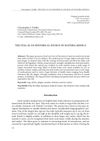
Drinking sweetened tea and poor sleep habits may increase the risk of hair loss in women.

Drinking sweetened tea and poor sleep increase the risk of hair loss in women.

Drinking sweetened tea and poor sleep habits increase the risk of hair loss in women.
[object Object] 
Drinking sweetened tea and late bedtimes increase the risk of hair loss in women.

Drinking sweetened tea and late bedtimes increase the risk of hair loss in women.
August 2024 in “Cosmetics” Personalized treatments for hair loss are becoming more effective by using genetic information.
 August 2024 in “Journal of Personalized Medicine”
August 2024 in “Journal of Personalized Medicine” Tamsulosin increases the risk of floppy iris during eye surgery.
August 2024 in “Journal of Clinical Medicine” PRP shows promise but lacks consistent evidence and regulation.
 June 2024 in “Skin Appendage Disorders”
June 2024 in “Skin Appendage Disorders” Both PRP and MZT treatments can significantly improve hair growth in patients with androgenetic alopecia.
 May 2024 in “International journal of nanomedicine”
May 2024 in “International journal of nanomedicine” Plant-derived extracellular vesicles show promise for treating diseases like cancer and inflammation.
 April 2024 in “Frontiers in pharmacology”
April 2024 in “Frontiers in pharmacology” Cynoglossum amabile has medicinal potential but poses safety concerns due to liver toxicity.
 April 2024 in “Journal of translational medicine”
April 2024 in “Journal of translational medicine” Melanocytes are important for normal body functions and have potential uses in regenerative medicine and disease treatment.
March 2024 in “Cosmetics” New regenerative techniques show promise for improving skin, healing wounds, and growing hair.
[object Object] February 2024 in “Cosmetics” The conclusion is that new plant-based treatments for hair loss may work by targeting certain enzymes.

Henna has many medicinal uses but needs more research to confirm its benefits.
 November 2023 in “Nature Communications”
November 2023 in “Nature Communications” Cells lacking the Bax protein can outcompete others, leading to better tissue repair and hair growth.

Kalya Research is an AI tool that effectively finds and analyzes alternative medicine literature, saving researchers time.
 November 2023 in “Stem cells and cloning”
November 2023 in “Stem cells and cloning” A new treatment using stem cell-conditioned media significantly improved hair growth in people with temporary hair loss.
 September 2023 in “Journal of the turkish academy of dermatology”
September 2023 in “Journal of the turkish academy of dermatology” Men with male pattern baldness had higher body fat and obesity-related measurements but similar heart fat and artery thickness compared to healthy men.
 July 2023 in “Indian Journal of Animal Health”
July 2023 in “Indian Journal of Animal Health” FGF-5 promotes Cashmere goat hair growth by increasing keratin genes and reducing certain LncRNA and target genes.
 May 2023 in “Clinical, Cosmetic and Investigational Dermatology”
May 2023 in “Clinical, Cosmetic and Investigational Dermatology” The research found proteins in human skin cells that help with wound healing and hair growth, which could lead to new treatments.
 March 2023 in “Scientific Reports”
March 2023 in “Scientific Reports” Using focused ultrasound on the brain can help epilepsy medicine work better in rats.
 January 2023 in “International Journal of Molecular Sciences”
January 2023 in “International Journal of Molecular Sciences” Maxillariinae orchids contain 62 compounds with potential health benefits, including treating skin conditions and diseases like cancer and diabetes.
 January 2023 in “Acta historiae medicinae stomatologiae pharmaciae medicinae veterinariae”
January 2023 in “Acta historiae medicinae stomatologiae pharmaciae medicinae veterinariae” Stag parts were historically used in medicine for various health issues.
 December 2022 in “Journal of complementary medicine & alternative healthcare”
December 2022 in “Journal of complementary medicine & alternative healthcare” Traditional Chinese medicine improved hair loss in a teenager with alopecia.
 April 2022 in “Anti-cancer agents in medicinal chemistry”
April 2022 in “Anti-cancer agents in medicinal chemistry” Some existing medicines show promise as safe treatments to protect against the side effects of radiation therapy.

False daisy is a medicinal herb with many health benefits, including hair growth promotion.
January 2021 in “Annals of translational medicine” YH0618 helped reduce skin and nail problems and fatigue in chemotherapy patients.
Cows moving from tie-stall to free-stall housing had more heel problems, less joint lesions, and higher stress levels.
 October 2020 in “Authorea (Authorea)”
October 2020 in “Authorea (Authorea)” Men and women react differently to opioids, with hormones potentially influencing these differences.
























